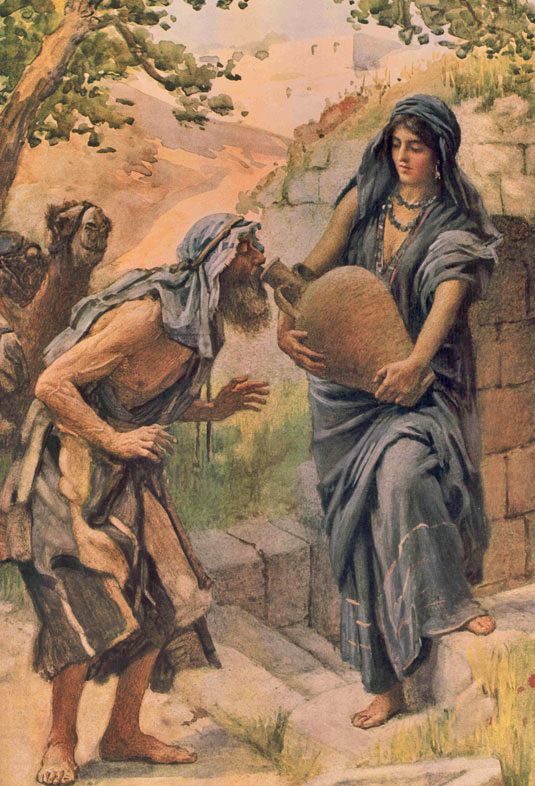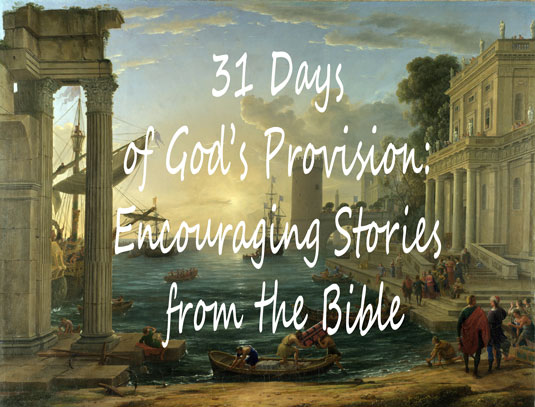 The story of the devoted servant takes place when Abraham was a very old man. When Abraham was just an old man, and his wife Sarah was also well along in years, God promised them a son. In Genesis chapter 21, God keeps that promise and Sarah gives birth to Isaac. God further promises that Abraham’s descendants will be so numerous that they cannot be counted, which means that at some point, Isaac must start a family of his own.
The story of the devoted servant takes place when Abraham was a very old man. When Abraham was just an old man, and his wife Sarah was also well along in years, God promised them a son. In Genesis chapter 21, God keeps that promise and Sarah gives birth to Isaac. God further promises that Abraham’s descendants will be so numerous that they cannot be counted, which means that at some point, Isaac must start a family of his own.
By the time our story opens, Sarah has passed away, Isaac is still single and Abraham is thinking about his yet-to-be-born grandchildren. The family is still living in the land of Canaan but Abraham knows that a bride for Isaac should be selected from his own people. For this important task, he enlists the help of his devoted servant.
I want you to swear by the Lord, the God of heaven and the God of earth, that you will not get a wife for my son from the daughters of the Canaanites, among whom I am living, but will go to my country and my own relatives and get a wife for my son Isaac.” Genesis 24:3-4, NIV
Now the servant is a bit hesitant about this plan, and immediately sees a potential problem.
The servant asked him, “What if the woman is unwilling to come back with me to this land? Shall I then take your son back to the country you came from?” Genesis 24:5, NIV
Abraham tells his servant that under no circumstances is Isaac to be taken to Abraham’s homeland. If the prospective young lady refuses to return with him, then the servant will be released from his obligation.
“Make sure that you do not take my son back there,” Abraham said. “The Lord, the God of heaven, who brought me out of my father’s household and my native land and who spoke to me and promised me on oath, saying, ‘To your offspring I will give this land’—he will send his angel before you so that you can get a wife for my son from there. If the woman is unwilling to come back with you, then you will be released from this oath of mine. Only do not take my son back there.” Genesis 24:6-8, NIV
Abraham is a man of faith and counts on God to lead his servant in this task. He had witnessed God’s faithfulness in the past and was confident that God would honor his promises yet to be fulfilled in the future. He knew that if the woman did not return with his servant, God would find another way to secure a wife for his son.
So the devoted servant, who had charge over all his master’s possessions, loads up ten camels and heads out for Abraham’s homeland. He stops at a town called Nahor. It is early evening when he arrives and the women of the town are coming out to the well to draw water. It seems that Abraham’s servant is also a man of faith, because he prays for guidance and discernment to complete the important mission his master has tasked him with.
Then he prayed, “Lord, God of my master Abraham, make me successful today, and show kindness to my master Abraham. See, I am standing beside this spring, and the daughters of the townspeople are coming out to draw water. May it be that when I say to a young woman, ‘Please let down your jar that I may have a drink,’ and she says, ‘Drink, and I’ll water your camels too’—let her be the one you have chosen for your servant Isaac. By this I will know that you have shown kindness to my master.” Genesis 24:12-14, NIV
As the plan of God unfolds, an attractive young lady comes out to the well, and she follows the script to a tee.
Before he had finished praying, Rebekah came out with her jar on her shoulder. She was the daughter of Bethuel son of Milkah, who was the wife of Abraham’s brother Nahor. The woman was very beautiful, a virgin; no man had ever slept with her. She went down to the spring, filled her jar and came up again. The servant hurried to meet her and said, “Please give me a little water from your jar.”
“Drink, my lord,” she said, and quickly lowered the jar to her hands and gave him a drink. After she had given him a drink, she said, “I’ll draw water for your camels too, until they have had enough to drink.” So she quickly emptied her jar into the trough, ran back to the well to draw more water, and drew enough for all his camels. Without saying a word, the man watched her closely to learn whether or not the Lord had made his journey successful. Genesis 24:15-21, NIV
The servant is convinced that Rebekah is the one chosen by God to become the bride of Isaac. He is invited to stay with the family where he explains himself and his mission, to them.
So he said, “I am Abraham’s servant. The Lord has blessed my master abundantly, and he has become wealthy. He has given him sheep and cattle, silver and gold, male and female servants, and camels and donkeys. My master’s wife Sarah has borne him a son in her old age, and he has given him everything he owns. And my master made me swear an oath, and said, ‘You must not get a wife for my son from the daughters of the Canaanites, in whose land I live, but go to my father’s family and to my own clan, and get a wife for my son.’ Genesis 24:34-38, NIV
The servant describes his prayer, how Rebekah responded, and how God unquestionably directed his journey. The family asks Rebekah if she is agreeable to this arranged marriage and she consents, so they bless Rebekah and send her on her way. When the caravan approaches Isaac’s home, he and Rebekah get a glimpse of one another.
Now Isaac had come from Beer Lahai Roi, for he was living in the Negev. He went out to the field one evening to meditate, and as he looked up, he saw camels approaching. Rebekah also looked up and saw Isaac. She got down from her camel and asked the servant, “Who is that man in the field coming to meet us?”
“He is my master,” the servant answered. So she took her veil and covered herself. Then the servant told Isaac all he had done. Isaac brought her into the tent of his mother Sarah, and he married Rebekah. So she became his wife, and he loved her; and Isaac was comforted after his mother’s death. Genesis 24:62-67, NIV
Abraham had faith that God would provide a suitable bride for his son. His servant on the other hand, was initially a bit hesitant about the plan. As the devoted servant carries out his master’s instructions, he realizes that he too, must trust in God if his mission is to be successful. He does, it is, and everybody goes to a wedding!
The devoted servant’s story was one of uncertainty, but God’s provision was one of direction.
Join me tomorrow for a story involving a chained prisoner, a praying church, and a provision of escape!
 If you’ve missed any part of this series, you can find all of the posts in the side bar category 31 Days of God’s Provision.
If you’ve missed any part of this series, you can find all of the posts in the side bar category 31 Days of God’s Provision.
On the journey toward Home,












{ 1 trackback }